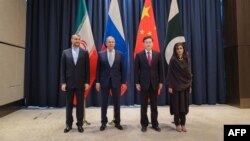Uzbekistan is hosting a conference Thursday of foreign ministers of regional countries, including Russia and China, to review the situation and cooperation with Taliban-ruled Afghanistan.
The event in the Uzbek city of Samarkand comes as the United Nations reviews its presence in the strife-torn South Asian nation after the radical Taliban barred female staff from working for the world body, the latest in a series of curbs placed on Afghan women.
Taliban Foreign Minister Amir Khan Muttaqi is attending Thursday's meeting with counterparts from Russia and six neighbors of Afghanistan, including China, Pakistan, Iran, Tajikistan, Uzbekistan, and Turkmenistan.
Muttaqi’s office confirmed his arrival in Samarkand on Twitter, saying Uzbek officials received him “warmly."
Chinese Foreign Minister Qin Gang and his Russian counterpart, Sergey Lavrov, earlier also arrived in Samarkand to attend the meeting.
A Russian Foreign Ministry statement said Wednesday that participants at the Samarkand huddle “will focus on the development of regional economic integration and the implementation of transport and energy projects involving Kabul under earlier agreements.”
On Wednesday, Chinese Foreign Ministry spokesman Wang Wenbin, responding to criticism of the Taliban's restrictions on women and lack of political inclusivity, told reporters Beijing supports "the Afghan government in adopting moderate, prudent and inclusive policies.”
Wang said his government had maintained contact with the Taliban government to help them and the Afghan people overcome reconstruction, economic development, and security-related challenges.
"China stands ready to step up coordination and cooperation with Afghanistan's neighbors and the rest of the world to help Afghanistan embark on a path of stability and development," he said.
Beijing and Moscow have stepped up engagements with the Taliban since they seized control of Afghanistan in August 2021 as U.S.-led Western troops withdrew after 20 years of war.
China’s Policy
Analysts say Beijing's growing engagement with Kabul stems from potentially vital economic opportunities and to expand Beijing's regional influence. They see Afghanistan's largely unexplored mineral wealth and the presence of anti-China militants in the country as the main drivers behind the increased Chinese diplomatic outreach.
The impoverished nation, reeling from years of war and natural calamities, links West Asia, Central Asia, and South Asia countries. China has invested billions of dollars in infrastructure and economic development projects in these countries under its global Belt and Road Initiative, hoping to make Afghanistan part of it.
"China welcomes Afghanistan's participation in Belt and Road cooperation and supports Afghanistan's integration into regional economic cooperation and connectivity that will transform Afghanistan from a 'land-locked country' to a 'land-linked country,'" the Chinese foreign ministry said in its Afghan policy document released on Wednesday.
China and Russia are among several regional and neighboring countries that have kept their embassies in Kabul after the Taliban takeover. But no foreign government has recognized the Taliban authorities, citing curbs on Afghan women and concerns stemming from other human rights abuses.
"We hope the Afghan interim government will protect the basic rights and interests of all Afghan people, including women, children, and all ethnic groups, and continue working actively to meet Afghan people's interests and the international community's expectations," the Chinese foreign ministry said Wednesday.
The United Nations has condemned the "unlawful" ban on hundreds of its Afghan female staff, imposed a week ago, and warned it could push the global organization to stop operations in the country.
The Taliban on Wednesday defended their decision to forbid Afghan women from working for the U.N., saying it is an internal matter that all parties should respect.
Afghanistan is home to one of the world's largest humanitarian crises, where the United Nations says 28.3 million people, or two-thirds of the population, need humanitarian assistance, with 6 million people on the brink of famine.





